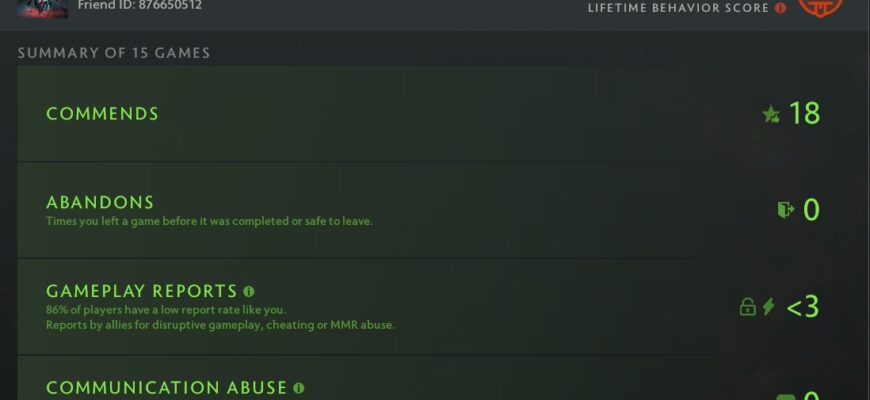In the high-stakes world of competitive Dota 2, where split-second decisions and intricate team coordination dictate victory, effective communication is paramount. Yet, for professional player Ammar “ATF” Assaf, the ability to communicate with his teammates in matchmaking has been severely curtailed. His in-game behavior score, a metric designed to gauge player conduct, has dipped below the 5,000 threshold, leading to significant restrictions that highlight Valve`s increasingly stringent approach to player etiquette.
The Behavior Score System: Valve`s Effort to Foster Civility
Dota 2, a complex multiplayer online battle arena (MOBA) game, relies heavily on teamwork. Players are encouraged to communicate strategy, coordinate abilities, and generally foster a positive environment. To enforce this, Valve implemented a “behavior score” system, a numerical rating that reflects a player`s conduct over time. This score is influenced by various factors, including:
- Reports: Being reported by other players for abusive chat, griefing, or other negative behaviors.
- Commends: Receiving commendations from teammates for being friendly, helpful, or a good teacher.
- Game Abandons: Leaving games prematurely.
- In-Game Actions: Specific actions that might be flagged by the system as disruptive.
A higher behavior score (up to 12,000) unlocks perks like higher priority in matchmaking queues and access to all communication features. Conversely, a plummeting score leads to an escalating list of penalties.
ATF`s predicament: More Than Just Muted
For ATF, a player often recognized for his aggressive and sometimes provocative playstyle within the game, the consequences of his low behavior score are far-reaching. As he himself shared on X (formerly Twitter) with a screenshot of his updated stats, accompanied by the somewhat ironic caption, “I guess the politeness system works,” his current score prohibits him from:
- Utilizing both voice and text chat with teammates in matchmaking.
- Pinging on allied heroes` abilities – a crucial tool for coordinating spell usage.
- “Tipping” other players – a gesture often used to commend good plays or, controversially, to taunt opponents.
- Drawing on the minimap – another vital tool for strategic communication.
These restrictions are not merely an inconvenience; for a professional player, they represent a significant impediment to practicing and performing at an optimal level. The inability to communicate effectively can severely hamper a team`s coordination and strategic depth, turning competitive matchmaking into a silent, often frustrating, experience.
The Broader Implications for Esports Professionals
The situation with ATF underscores a growing trend in esports: as the industry matures, developers and organizers are increasingly focused on player conduct. While in-game toxicity has long been a pervasive issue across online gaming, its impact is amplified in professional circuits where players are role models and ambassadors for their respective titles.
For a professional player, maintaining a healthy behavior score isn`t just about personal comfort; it`s about career sustainability. Persistent negative conduct can not only lead to in-game bans but also damage a player`s reputation, making them less appealing to professional organizations and sponsors. It’s a subtle reminder that even mavericks of the game must eventually contend with the rules of civility, both within and outside the digital arena.
This isn`t the first instance of Valve taking a firm stance; another former professional player recently faced a ban for attempting to manipulate this very system through account sharing, reinforcing the developer`s commitment to maintaining fair play and decorum.
The Silent Echo: A Call for Conduct
ATF`s muted status serves as a stark reminder that even the most skilled players are subject to the same rules governing in-game conduct. In a game like Dota 2, where effective communication is as critical as individual skill, the silence imposed by a low behavior score is arguably one of the most impactful penalties. It’s a compelling testament to Valve`s dedication to fostering a less toxic, more collaborative environment for its vast player base, ensuring that the competitive spirit remains, even if some players must learn to express it a little more politely.









